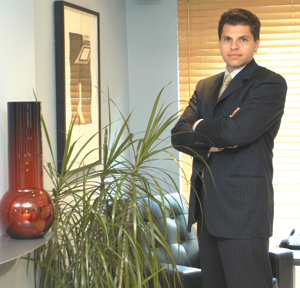Small cracks are emerging in the solidarity of the province’s criminal defence bar just as boycotting lawyers prepare to sit down with government officials for negotiations.

Clay Powell, a prominent London criminal lawyer, has agreed to defend an accused on a legal aid certificate in a high-profile murder trial in Kitchener, Ont.
Powell says the boycott of murder and guns-and-gangs cases over inadequate legal aid funding abandons those accused of the most serious crimes.
“They’re sitting in jail charged with murder, and you don’t have a lawyer? I suppose that’s a disservice,” Powell says. “I don’t think that withholding services is the way to get more money paid to lawyers.”
He likens the boycott to a refusal by a brain surgeon to operate for rates paid by the province.
So he accepted an offer from Legal Aid Ontario to represent one of three men accused in the February shooting death of Nadia Gehl.
Powell says he wasn’t initially aware he was wading into such a contentious political situation, as the Gehl trial has become a staging ground for the fight for enhanced legal aid fees. Current counsel for the accused have asked a judge to increase their tariffs to $170 per hour.
However, Powell realizes that undermining the boycott won’t win him any favour among his colleagues.
“I’m very widely disliked for my stance.”
Dissenting voices have been few since the outset of the boycott.
In fact, support for expanding the provincewide action has been overwhelming, according to the Criminal Lawyers’ Association, which was on the verge of including additional offences in the boycott when the province offered to hold funding discussions.
Powell’s move does little to affect that united front, says Paul Burstein, incoming CLA president.
“It’s one case, it’s one lawyer. Obviously, Mr. Powell is a respected, senior member of the criminal bar. But he obviously marches to the beat of his own drum.”
Burstein notes LAO has been calling hundreds of lawyers whose names don’t appear on the list of boycott supporters before finding someone to accept a certificate for a serious case.
And he points to Powell’s admission that one reason the London lawyer can afford to accept cases at legal aid rates is because he operates out of his own home with no staffing or overhead costs.
Burstein also explains that two experienced Crown attorneys, who have full administrative resources at their disposal, will be prosecuting the case. Compare that to the efforts of a single defence lawyer working out of a home office, he says.
“I question anyone’s ability to help their client make full answer and defence in a complex murder case without some level of supporting cast. I think it would very likely lead to pursuing an appeal on that basis.”
A second defence lawyer, Avrum Flisfeder, who has no experience on murder trials, has filed an affidavit offering his services for the trial, Burstein says.
If Flisfeder takes on the case, Burstein asks, which of the accused will he represent and which will get the more experienced Powell?
“How do we decide that? Flip a coin?”
On the other side of that coin are veterans of murder trials ardently supporting the boycott.
Since being called to the bar 25 years ago, John Struthers has acted on 56 homicide trials.
Before he began refusing legal aid certificates, murder trials in the Greater Toronto Area accounted for about half of his work as a sole practitioner.
“These are the toughest and most interesting cases in the criminal justice system,” Struthers says.
Only about 100 experienced criminal lawyers handle almost all GTA murder trials, giving “fantastic representation on extremely difficult cases,” Struthers says. “The government doesn’t know how lucky it is.”
That expertise and experience mean fewer mistrials and appeals, which saves the system time and money, he adds.
The need for properly funded defences grows, he says, as guns-and-gangs investigations bring extraordinarily complex cases with multiple accused before the courts.
“Many of them are the size of the Nuremberg trial.”
Since the boycott began, Struthers says he has had no problem in directing his talents to other areas of criminal law.
“I find it in many ways relaxing. Many of us are wondering why we suffered for so long.”
And he finds himself getting paid more for simpler work.
“You get more money doing an impaired-driving case on a Tuesday than doing a murder trial for two weeks.”
It’s that imbalance that is pushing talented lawyers away from accepting legal aid work, Frank Addario said recently at the CLA’s fall conference.
While similar efforts to lobby the government to reform legal aid have failed in the past, Addario said the criminal bar has a new determination this time around.
“It costs real money to deliver justice. Legal aid is not a charity, and the people who provide its services are not volunteers,” Addario said in his final speech as CLA president.
The day before the association’s board was set to vote on a motion to broaden the boycott and withdraw from the Justice on Target strategy, the Ministry of the Attorney General opened the door to talks, Addario said.
“This is the opportunity we’ve been asking for to sit down and explain to the ministry why the amount of money put out there is inadequate to fix the program and restore its credibility.”
The province has agreed to a 60-day period of discussions on tariffs and the allocation of funding.
However, Addario warned that the bar will promptly escalate its fight if the province’s conciliatory gesture proves to be empty.
“Given how long the matter has been studied, we should know very quickly if this process is a waste of time.”

 Clay Powell, a prominent London criminal lawyer, has agreed to defend an accused on a legal aid certificate in a high-profile murder trial in Kitchener, Ont.
Clay Powell, a prominent London criminal lawyer, has agreed to defend an accused on a legal aid certificate in a high-profile murder trial in Kitchener, Ont.